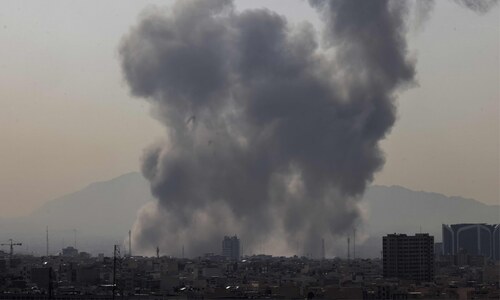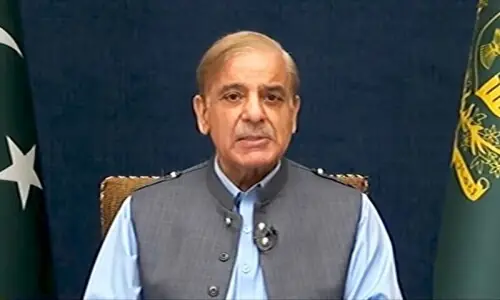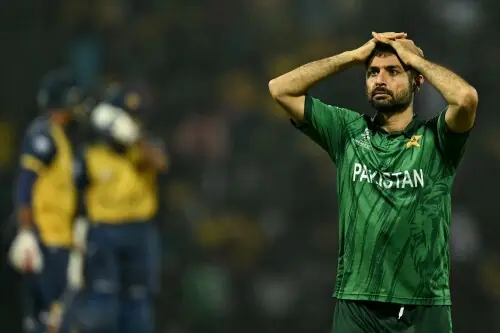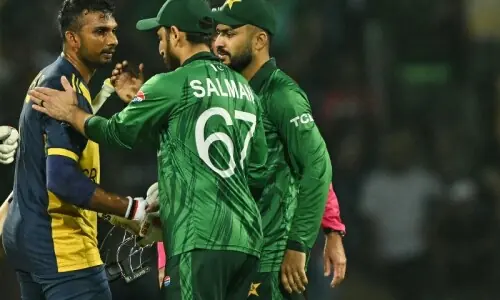WASHINGTON, Feb 20: The United States has rejected the truce in Swat but US Defence Secretary Robert Gates said on Friday that Washington could accept a similar agreement between the government and Taliban militants in Afghanistan.
The US rejection was conveyed by its special envoy Richard Holbrooke who called President Asif Ali Zardari on Thursday evening to tell him that the Swat deal was tantamount to surrender by Pakistan.
Later, Mr Holbrooke told CNN that the Pakistani leader had assured him that the Swat deal was only an “interim arrangement” to stabilise the restive region and that he had not yet signed an agreement with the militants.
In a separate briefing on Friday, Defence Secretary Robert Gates told reporters in Poland that the United States could accept a political agreement between the Afghan government and Taliban rebels along the lines of the Swat deal.
“We have said all along that ultimately some sort of political reconciliation has to be part of the long-term solution in Afghanistan,” media reports quoted Mr Gates as saying.
Asked whether Washington would approve a Swat-like agreement between Kabul and Taliban guerrillas, Mr Gates replied: “If there is reconciliation, if insurgents are willing to put down their arms, if the reconciliation is essentially on the terms being offered by the government then I think we would be very open to that.”
The Swat deal, however, appears to have irked Mr Holbrooke who earlier this week also criticised the Pakistani military for not sharing President Zardari’s commitment to fighting the militants.
Pakistan has defended its effort to make a peace deal with the militants, saying that it was part of a pragmatic military and political strategy to turn Swat’s native populations against the terrorists.
Hard to understand
Ambassador Holbrooke, who returned from a fact-finding visit to South Asia earlier this week, rejected this argument.
“It’s hard to understand this deal in Swat, the area you’re talking about, less than 100 miles from the capital in Islamabad,” he said.
Mr Holbrooke described the Swat militants as “murderous thugs and militants (who) pose a danger not only to Pakistan, but to the United States and India”.
President Zardari, he said, “doesn’t disagree” with this description.
Asked whether President Zardari had given him a commitment to stop the accord, Ambassador Holbrooke said: “Well, he hasn’t signed the deal.”
“Will he?” the US envoy was asked.
“That I don’t know. But the issue isn’t whether he signs the deal or not, the issue is the negotiations themselves. And I’m concerned, and I know Secretary Clinton is, and the president (Obama) is, that this deal, which is portrayed in the press as a truce, is not -- does not turn into a surrender.”
Mr Holbrooke said that President Zardari had not only assured the US that Pakistan will not surrender to the militants but is also sending a very high- level delegation to Washington next week for talks on this and other issues.
The delegation will include the foreign minister and several senior military officials, Mr Holbrooke said. He said Pakistan’s army chief General Ashfaq Kayani and the head of ISI would also be in Washington next week for similar talks.
“And I can assure you, and President Zardari knows this, that this (the Swat deal) will be the top initial subject of conversation,” said Ambassador Holbrooke.
Mr Holbrooke was then asked to comment on a recent statement by the former secretary of state, Madeleine Albright, who said: “Pakistan has everything that gives you an international migraine. It has nuclear weapons. It has terrorism, extremists, corruption, very poor, and it’s in a location that’s really, really important to us.”
“How worried are you?” Ambassador Holbrooke was asked.
“This is a legitimate concern. The United States cannot ignore it. The American intelligence community has briefed us,” he said. “But we have been assured by the American intelligence community that this arsenal is under the control of the Pakistan military. But it’s an issue of high concern and it can’t be ignored.”
Ambassador Holbrooke, who brokered a peace deal in Bosnia, was asked what was harder: Bosnia or his present assignment in Afghanistan and Pakistan.
“This is harder … much harder,” he replied.































